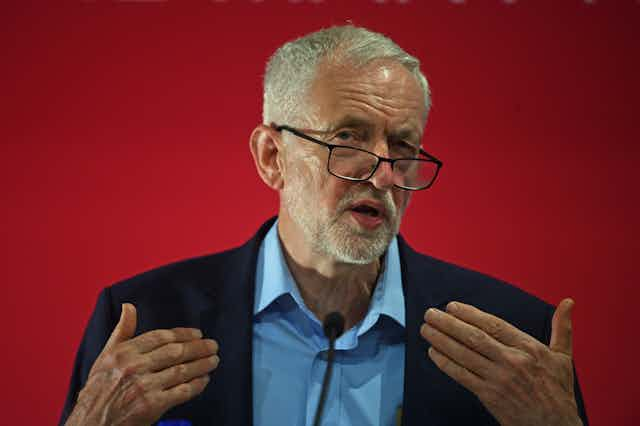Labour leader Jeremy Corbyn says he has devised a plan, which he claims could stop no-deal Brexit. This involves calling a vote of no confidence in the government and replacing Johnson with a temporary prime minister at the head of a unity government bringing together opposition parties.
Doing this before the October 31 deadline would, according to Corbyn, enable the new prime minister to change course and either ask the EU for a further extension (which, on its own, would not require parliamentary support), to hold an election or another referendum or to revoke article 50 (though each of these would require MPs’ support).
Holding (and even winning) a vote of no confidence would not, in itself, install a new prime minister. It would instead give the House of Commons 14 days to find one. Should no government be able to command the support of the House of Commons in this time a new election would be called. The new prime minister need not necessarily be Corbyn but any new government would need to be in place within this two-week period.
Who needs to support Corbyn’s plan?
To be guaranteed success in the House of Commons, Corbyn’s motion needs 322 votes. The Labour Party currently has 247 MPs, though it is by no means guaranteed that all of them would support blocking no deal. The Scottish National Party (35 seats), Plaid Cymru (four seats) and The Green Party (one seat) have all said they are willing to listen to Corbyn’s plans to ensure that a no-deal Brexit is averted. Allowing for half a dozen or so Labour rebels, this could give Corbyn around 280 votes.
This leaves Corbyn 40-45 votes short of securing a majority (assuming there are no abstentions) to bring down the current government. Potential Conservative rebels are hard to pin down but could include Nick Boles, who has previously worked with opposition MPs to support moves to block no deal, Kenneth Clarke, a pro-European Conservative and former chancellor of the exchequer Phillip Hammond. Other names touted as potential rebels include Dominic Grieve and Guto Bebb. It’s estimated that as many as 12 Conservative MPs could rebel to vote no confidence in their own prime minister.
Importantly, there are potentially more Conservative rebels willing to vote down the government than there are Labour rebels willing to vote with the government. That could push the number supporting Corbyn’s plan to more than 290 votes – though it is by no means certain that any MP mentioned here would vote in favour of installing a Corbyn-led government. It’s also possible that some will abstain – which would be of less use to Corbyn, but would mean that the confidence motion could pass with fewer than 322 votes.
The DUP, independents and Lib Dems
That leaves Corbyn needing around 25-30 votes to pass his motion of no confidence. Of the remaining MPs, 15 sit as independents. Some independents, such as Frank Field, are unlikely to support the motion. They don’t accept that no deal is worse than an election or a Corbyn-led government. But some could still be persuaded this plan represents the last chance of avoiding a no-deal Brexit, giving Corbyn about five votes.
The DUP will face an unpleasant binary choice, between voting against the government and thus risking the potential of a Corbyn led administration, even a temporary one, or supporting the government and risking a no deal, which could lead to greater calls for a united Ireland or further divergence between Northern Ireland and the rest of the UK. Given these options, their support for Johnson may not be guaranteed.
That brings us to the Liberal Democrats, who hold the remaining 14 seats. Their leader Jo Swinson, despite pledging to do everything to stop no-deal Brexit, has said she opposes allowing Corbyn to be prime minister and that she would favour finding other candidates to take the role. However that might change when she is faced with the binary choice of supporting Labour’s motion of no confidence or no deal. The same could be true for The Independent Group for Change (five seats).
Indeed, Swinson had initially opposed Corbyn’s plan outright but has since said she is open to talks in a partial climb down.

It would make sense for the Liberal Democrats to support Corbyn. Would Swinson really risk not having been seen to be part of the process to stop no-deal Brexit? At the very least, that would raise awkward questions from voters in any imminent election campaign.
Corbyn and his supporters will be keen to highlight these binary options in a similar manner to Theresa May’s language of deal or no deal. Though the difference here is that they do not have (the power) to implement the threat. Although some may be unconvinced, it’s plausible that Corbyn could get enough MPs to support the vote of no confidence – or at least enough MPs to abstain to give him the required numbers.
If the motion does pass, Corbyn will have to convince others he could form a temporary government to advert no deal. The opposition parties must be mindful that defenders of the prime minister insist that if the house was unable to find a new prime minister, it would be up to Johnson to pick the date of the election – and it could take place after October 31, when the UK is scheduled to depart the EU.

